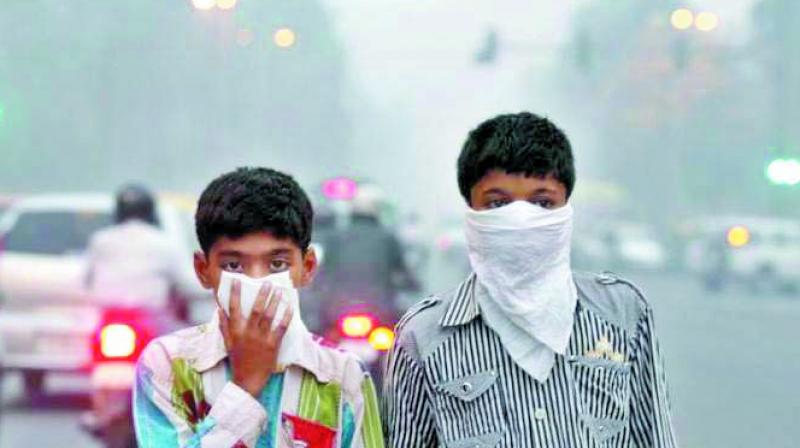In Gurugram, everyone is afraid to breathe
The PWD is already sprinkling water on roads to reduce dust.

After pollution levels in the Capital reached staggering new heights this winter, the Delhi government faced a barrage of criticism. But Delhi Environment Minister Imran Hussain views this as a problem not specific to Delhi, saying the Centre must step in and stop the burning of crop stubble in neighbouring states. From cloud-seeding technology to a blanket ban on firecrackers, the Aam Aadmi Party government is willing to take a host of drastic measures to deal with the exacerbated pollution crisis, Mr. Hussain tells Pratik Kumar.
Q. How do you view Delhi’s pollution crisis? And what has the government done about it?
For the last one year, we have been diligent in addressing issues related to burning of leaves and garbage and dust control. Every fifteen days, we review the progress we make. One can obtain a detailed report from the Delhi Pollution Control Committee and see how much work we have done, the number of challans we issued or actions we have taken. Because the situation turned critical almost immediately unlike last year, we took an array of measures. We shut down construction sites for a week. We have created teams comprising environmental engineers and sub-divisional magistrates (SDMs) in 11 districts of Delhi to take action against violations — burning of waste and leaves and dust pollution. Chief Minister and I are monitoring the situation. Schools are closed. We have shut the Badarpur Thermal Power Plant, which generates fly ash. The Public Works Department started vacuum cleaning roads. The PWD is already sprinkling water on roads to reduce dust.
Q: Is burning of crop stubble in neighbouring states a major issue?
A. Crop burning has had a major impact on the Delhi’s pollution levels. It contributes to 70 per cent of the air pollution in Delhi, as per NASA’s report. The issue is beyond our realm. A lot depends on the direction and speed of winds. Delhi is surrounded by 4,000 brick kilns and air polluting industries as well. Along with the neighbouring states, we are discussing what could be done about it.
Q. The Centre initially claimed that among the neighbouring states only Punjab has failed to make substantial progress in preventing agricultural fires.
A. There is nothing of that sort.
Q. Has the government asked DPCC to explore the possibility of hiring an expert agency to suggest ways to arrest the rising air pollution?
A. We have asked the Union government if the Central Pollution Control Board (CPCB) can submit a report on why pollution levels have spiked in Delhi. Is it because of the dust or the Diwali fireworks? Or is it the crop burning or brick kilns? If they tell us about the primary sources of pollution, we will act accordingly.
Q. Would you be in favour of a complete or blanket ban on crackers in Delhi?
A. We have already done it.
Q. That’s an immediate measure. How about banning it forever?
A. We are going to do that. We will certainly ban crackers in Delhi.
Q. How does the government put the fines collected from polluters to good use?
A. All the ‘challan’ money collected from polluting vehicles goes to the transport department. Ditto, the cess or environment compensation charge, levied on trucks entering Delhi. We have an air ambience fund, that is used to subsidise e-rickshaws, electric vehicles and other environment-friendly things.
Q. The Delhi government seems to be exploring new technological solutions to curb air pollution. There is a buzz about cloud seeding to fight Delhi’s smog.
A. We have asked the Centre to look into it. We are a Union Territory — not a full state, we don’t have full control over the police. We have asked the Centre to hold talks, bring in new technology. We will take care of the finances. Such issues intrinsically involve the Centre, as the problem is ‘regional’ in nature. Faridabad and Gurgaon in Haryana, Noida in Uttar Pradesh and even Punjab face a similar situation. Pollution levels in Gurgaon are higher than that of Delhi.
If China could use new technologies, why can’t we?
Q. We hear the government is in talks with the makers of ‘smog-sucking’ towers. Beijing recently installed one.
A. Yes, that is correct.
Q. What about Euro - VI norms?
A. That’s for the transport department to say. It’s under discussion.

